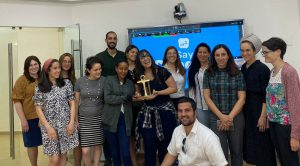Decent Work and Economic Growth


Home » 8 Decent Work and Economic Growth » SDG 8- How’s the “Impact Nation” Transition Going? – Part 2
SDG 8- How’s the “Impact Nation” Transition Going? – Part 2
Read Part 1
In Part 1 of this series we focused primarily on developments in the impact investment world. Of course, Israel still needs to retain the foundations of “Startup Nation” in order to evolve toward “Impact Nation”, particularly when it comes to strengthening activities relevant to SDGs such as quality education (4) as well as decent work and economic growth (8). Let’s see where matters stand in this context.
First, some good news. “Startup Nation” in its most familiar sense – what we’ve come to know especially in the past decade – is definitely alive and kicking: in the first eight months of this year, tech job openings have reportedly grown by 300%, with around $15 billion raised during this period. Not bad for a year of crisis.


But – and this is a big But – something’s not right just below the surface, certainly when examined through a social impact lens. These headlines from “Haaretz” speak for themselves:
- “Israel Admits: The Richer You Are, the More Likely You’ll Open a Startup”, a report based on a study released in January by the Finance Ministry’s chief economist’s department.
- “Israel’s High-tech Industry Has a Diversity Problem. Here’s Why”, a piece reflecting a well-known but rarely mentioned fact that no more than 10% of Israeli employees are actually benefiting financially from the “Startup Nation” phenomenon. Much work remains to advance the integration of women, Haredi Jews and Arabs; the latter group – particularly – continues to draw regular attention, from critical studies such as this by the NGO PresenTense to the recent Science and Technology Ministry decision to invest in a five-year, half-billion shekel program to promote high-tech and science in the Arab community. The private sector is also very much in the mix, of course; the VC fund Takwin Labs, which invests only in startups with at least one Arab founder – and where our changemaker Fadi Swidan holds a senior position – is just one example.
“Israel’s Schools are Flunking English, and Startup Nation is Paying the Price”, a report dealing with an ongoing challenge highlighted, in a much broader sense, by a new study from the Shoresh Institution for Socioeconomic Research.
The overall picture that these headlines reflect explains Israel’s growing shortage of tech employees and the government’s decision to recruit suitable candidates from abroad. Of course, that won’t solve the long-term challenge at home.
Recognizing this, the Israel Innovation Authority has launched a new initiative to fund startups and programs training skilled employees for high-tech. Looking further down the road, an initiative jointly formulated by the Education and Science ministries is now integrating into the school curriculum from kindergarten onward – starting with the new school year just begun – computer science, robotics and other fields relevant to the high-tech industry.
These latest government decisions appear to be the right direction, not only to solve Israel’s long-term economic challenges but rather – and no less important – to strengthen the country’s implementation of the UN’s SDGs.
Related articles


SDG 8- Israel Took the Initiative in Innovation with Project Yozma-By Dr. Eitan Eliram Lead Innovation Strategist
Decent Work and Economic Growth Staring at triple-digit inflation and imminent bankruptcy in the 1980s, the Israeli government resolved to make a decisive shift from


SDG 8-OGEN: Giving the Disadvantaged An Equal Opportunity-By Dr. Eitan Eliram Lead Innovation Strategist July 2024
Decent Work and Economic Growth “Life is a loan, and the interest is good deeds.” – OGEN Founder Eliezer Jaffe The COVID-19 Pandemic had a


SDG 8 – Shifting from “Profits Only” Mode to an Economic, Social and Environmental Impact Model -In collaboration with Dr. Eitan Eliram Lead Innovation Strategist June 2024
Decent Work and Economic Growth In 1961 former US President John F. Kennedy coined the guiding principle of public activity to this day “Don’t ask


















